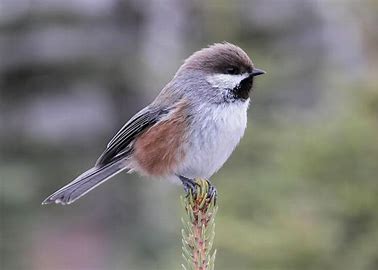| Boreal Chickadee | ||
 |
Classification(s) : | Prey |
| Cat Name : | Chickadee | |
| Common Name : | Boreal Chickadee | |
| Scientific Name : | Poecile hudsonicus | |
| Other Name(s) : | ||
| Physical Description : | The boreal chickadee has a brown cap, with a white chest, cheeks and belly. It’s upperparts are a brown/grey colour while its wings and tail are grey in colour. Its underparts are white, with brown on its flank, and a black bib. Its bill is short and dark, and its wings are small. It has a notched tail feathers. |
|
| Physical Statistics : | Length: 5 – 5.5 inches (13 – 14 cm) Weight: 0.35 oz (10g) Wingspan: 8.25 inches (21 cm) |
|
| Behavior : | Generally found foraging on conifer branches or bark looking for insects and conifer seeds. They store large amounts of food within different trees – usually within the mid-region. The Boreal Chickadee’s call involves a high-pitched trill, and they are typically found in boreal forests – forests with mainly coniferous trees such as pines, larches and spruces. |
|
| Social Organization : | Boreal chickadees often forage in small flocks that include other small birds, or can be found with its mated pair for the year. |
|
| Approval Level : | None; Boreal chickadees are common birds. | |
| Kill Difficulty : | Low; These birds are small and unable to fight back one in the jaws of a predator. |
|
| Training Level : | General; These birds are commonly found, making them good for beginner practice on hunting tiny birds. |
|
| Hunting Tactic : | Tiny Birds | |
| Food Quality : | Low; Little meat contained within the bird. Flesh is rich but not plentiful. | |
